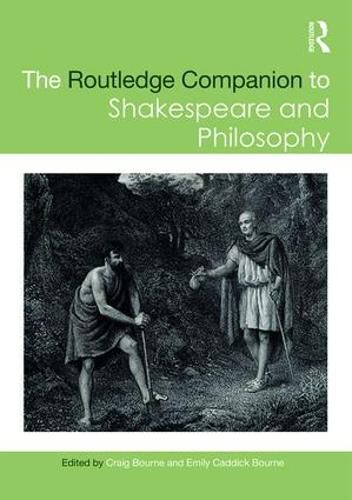Readings Newsletter
Become a Readings Member to make your shopping experience even easier.
Sign in or sign up for free!
You’re not far away from qualifying for FREE standard shipping within Australia
You’ve qualified for FREE standard shipping within Australia
The cart is loading…






Iago’s ‘I am not what I am’ epitomises how Shakespeare’s work is rich in philosophy, from issues of deception and moral deviance to those concerning the complex nature of the self, the notions of being and identity, and the possibility or impossibility of self-knowledge and knowledge of others. Shakespeare’s plays and poems address subjects including ethics, epistemology, metaphysics, philosophy of mind, and social and political philosophy. They also raise major philosophical questions about the nature of theatre, literature, tragedy, representation and fiction.
The Routledge Companion to Shakespeare and Philosophy is the first major guide and reference source to Shakespeare and philosophy. It examines the following important topics:
What roles can be played in an approach to Shakespeare by drawing on philosophical frameworks and the work of philosophers?
What can philosophical theories of meaning and communication show about the dynamics of Shakespearean interactions and vice versa?
How are notions such as political and social obligation, justice, equality, love, agency and the ethics of interpersonal relationships demonstrated in Shakespeare’s works?
What do the plays and poems invite us to say about the nature of knowledge, belief, doubt, deception and epistemic responsibility?
How can the ways in which Shakespeare’s characters behave illuminate existential issues concerning meaning, absurdity, death and nothingness?
What might Shakespeare’s characters and their actions show about the nature of the self, the mind and the identity of individuals?
How can Shakespeare’s works inform philosophical approaches to notions such as beauty, humour, horror and tragedy?
How do Shakespeare’s works illuminate philosophical questions about the nature of fiction, the attitudes and expectations involved in engagement with theatre, and the role of acting and actors in creating representations?
The Routledge Companion to Shakespeare and Philosophy is essential reading for students and researchers in aesthetics, philosophy of literature and philosophy of theatre, as well as those exploring Shakespeare in disciplines such as literature and theatre and drama studies. It is also relevant reading for those in areas of philosophy such as ethics, epistemology and philosophy of language.
$9.00 standard shipping within Australia
FREE standard shipping within Australia for orders over $100.00
Express & International shipping calculated at checkout
Iago’s ‘I am not what I am’ epitomises how Shakespeare’s work is rich in philosophy, from issues of deception and moral deviance to those concerning the complex nature of the self, the notions of being and identity, and the possibility or impossibility of self-knowledge and knowledge of others. Shakespeare’s plays and poems address subjects including ethics, epistemology, metaphysics, philosophy of mind, and social and political philosophy. They also raise major philosophical questions about the nature of theatre, literature, tragedy, representation and fiction.
The Routledge Companion to Shakespeare and Philosophy is the first major guide and reference source to Shakespeare and philosophy. It examines the following important topics:
What roles can be played in an approach to Shakespeare by drawing on philosophical frameworks and the work of philosophers?
What can philosophical theories of meaning and communication show about the dynamics of Shakespearean interactions and vice versa?
How are notions such as political and social obligation, justice, equality, love, agency and the ethics of interpersonal relationships demonstrated in Shakespeare’s works?
What do the plays and poems invite us to say about the nature of knowledge, belief, doubt, deception and epistemic responsibility?
How can the ways in which Shakespeare’s characters behave illuminate existential issues concerning meaning, absurdity, death and nothingness?
What might Shakespeare’s characters and their actions show about the nature of the self, the mind and the identity of individuals?
How can Shakespeare’s works inform philosophical approaches to notions such as beauty, humour, horror and tragedy?
How do Shakespeare’s works illuminate philosophical questions about the nature of fiction, the attitudes and expectations involved in engagement with theatre, and the role of acting and actors in creating representations?
The Routledge Companion to Shakespeare and Philosophy is essential reading for students and researchers in aesthetics, philosophy of literature and philosophy of theatre, as well as those exploring Shakespeare in disciplines such as literature and theatre and drama studies. It is also relevant reading for those in areas of philosophy such as ethics, epistemology and philosophy of language.